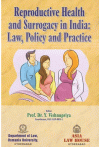- Publisher: Asia Law House
- Edition: 1 Ed 2020
- ISBN 13 9789389286618
- Approx. Pages 326 + Contents
- Format Paperback
- Approx. Product Size 24 x 16 cms
- Delivery Time 3-5 working days (within Kerala & South India) (Others 7-9 days)
- Shipping Charge Extra (see Shopping Cart)
...................................................................................................................................................................................................................................
Description
As the family goes, so goes the nation and so goes the whole world in which we live. Every single family in every nation contributes collectively to make this world go on and on. When man starts his family, the urge to have children is natural. Unfortunately many are denied the joy of parenthood due to several biological, medical or other reasons. In Olden days infertile couples were forced to go for adoption of children. However, with the advancement in science and technology; doctors got a chance to help their patients. One of the ways for infertile couples to have biologically related children though medical intervention is "Assisted Reproductive Technology" (ART). There are many different types of ARTs available today, viz. IVF, GIFT, ZIFT, donor eggs or sperm and importantly surrogacy. ARTs offer ways to create children despite underlying problems. ARTs sometimes requires the use of reproductive resources like sperm, eggs or wombs from third parties who are not expected to play a role in raising the resultant children.
......................................................................................................................................................................................................................................
Contents
1. Surrogacy Law, Policy and Practice
2. Assisted Reproductive Technology : Resisted Reproductive Rights of Women
- A Need for Stringent Law
3. Reproductive Rights in International Arena - An Overview
4. Law of Surrogacy in India - An Analysis
5. Surrogacy: Is There any Need to Impose Ban on Commercial Surrogacy>
6. Surrogacy through a Child's Perspective
7. Surrogacy in India - Law and Practice
8. Surrogacy in India : Social and Legal Implications
9. Personal Autonomy in Gestational Surrogacy
10. Infertility, Reproductive Technologies and Law
11. Surrogacy: Socio-Legal and Ethical Aspects
12. Surrogacy in India: Socio -Economic and Ethical Aspects and Challenges
13. Assisted Reproductive Technologies Involving Surrogacy
14. Judicial Response on Surrogacy
15. Reproductive Autonomy as a Positive and Negative Right - An Analysis
16. The Law Relating to Surrogacy in India
17. Surrogacy (Regulation) Bill, 2019 and its Adherence to Golden Triangle of the
Constitution
18. A Study on Reproductive Autonomy as a Private Right of Women an Surrogacy
19. Analyzing the Legal and Ethical Issues Concerning Surrogacy (Regulation) Bill
20. Reproductive Rights and Rights of Child with Disability: Possibility of Balance?
21. International Instruments on Surrogacy: A Comparative Study
22. Comparative Analysis of Surrogacy Laws in India and United Kingdom : A Study
23. Surrogacy: Exploitation vs Empowerment, A Feminist Perspective
24. Socio-Ethical Impact of Surrogacy and its Challenges
25. Surrogacy Contracts and their Validity
26. Libertarianism and Commercial Surrogacy
27. Surrogate Parenthood and its Socio-Legal Implications
28. Babies Market - Surrogacy and Adoption
29. Changing Dimensions of Surrogacy Laws in India
30. Law Relating to Surrogacy in India
31. Surrogacy - A Bought Motherhood
32. Contradictions of Reproductive Rights and Human Rights: Critical Analysis of
Surrogacy in Light of Surrogacy (Regulation) Bill, 2019
33. Surrogacy: Social, Legal and Ethical Aspects
34. Surrogacy : From Commercialisation to Prohibition
35. Surrogacy : A Womb for Rent
............................................................................................................................................................................................................................
Author Details
Prof. Vishnupriya Yadlapalli did her Master of Arts (M.A.) with specialization of Industrial Economics and Master of Laws (L.L.M.) with specialization of Industrial Economics and Master of Laws (L.L.M.) with specialization of Labour Laws. She cleared UGC NET (National Eligibility Test) in 1993. She conducted empirical research for her Doctoral Degree (Ph.D.) on the topic Child Labour: A Socio-Legal Study with reference to Slate Mines of Markapur in Andhra Pradesh, India where incidence of child labour is servere.
She worked as Dean, Faculty of Law, Osmania University. She was the Chairperson, Board of Studies in Law and Head, Department of Law, Osmania University Hyderabad. She is Chairperson, Board of Studies in Law, Mahatma Gandhi University, Nalgonda. She is member of Board of Studies in Law of many Universities, Board Examiners and selection committee of various Universities, UPSC and State Public Service Commissions.
............................................................................................................................................................................................................................

